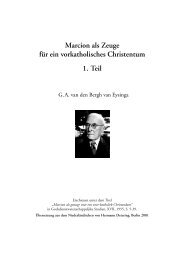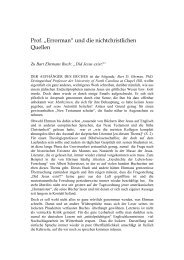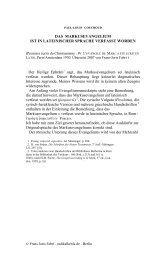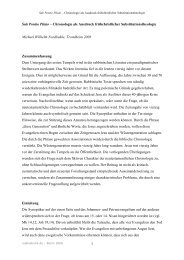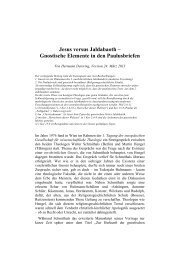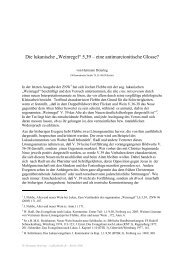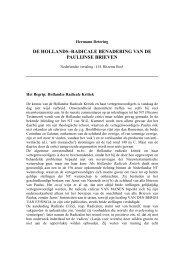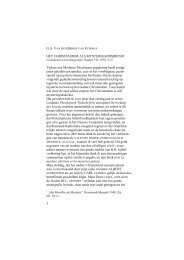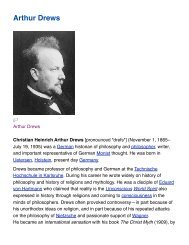Arthur Drews - Radikalkritik
Arthur Drews - Radikalkritik
Arthur Drews - Radikalkritik
Create successful ePaper yourself
Turn your PDF publications into a flip-book with our unique Google optimized e-Paper software.
- 16 -Emperor Julian, Hypatia, Augustine and Christian theology, <strong>Arthur</strong>Schopenhauer, and Henri Bergson.▪ A year later, <strong>Drews</strong> wrote Der Monismus : dargestellt in Beiträgen seiner Vertreter,Jena, 1908, where he analyzes the major philosophers of Monism▪ In 1913, he published History of Monism in Antiquity (1912) throughout the variousschools of Hellenistic philosophy;<strong>Drews</strong> thus managed to produce a modern system of philosophy joining the ancientidealism and monism of Plotinus's Neoplatonism and the modern Historical Idealism ofHegel, for whom the World-Spirit manifests itself in History.Towards the end of his life, <strong>Drews</strong> starts writing more explicitly on what the idea of amonist "God" means in the context of modern Germany in the 1930s: God (1930); TheWord of God (1933) —demonstrating his trend towards a German-inspired form ofreligion.6.5 Astromythical Views Related to Early Christianity<strong>Drews</strong>, always striving for objectivity in his historical approach, was intrigued by thealleged influence of ancient astronomy on the origins of religion, developed by theFrench Volney and Dupuis, and promoted throughout the 19th century. He includedmodern considerations on astromythical topics in some pages of his major books.▪ The Appendix to his 1912 book The Witnesses to the Historicity of Jesus was anessay on the astral speculations of the Ancients in relation to Psalm 22.▪ Hoffers notes that, in the 1921 book on The Gospel of Mark as a Witness against theHistoricity of Jesus, <strong>Drews</strong> shows "how Mark's reflects an astromythical triplejourney along the zodiac".▪ In 1923 <strong>Drews</strong> published a general introduction into astral mythology, Dersternhimmel in der Dichtung und Religion der Alten Völker und desChristentums, eine Einführung in die Astralmythologie (The Celestial Sky in thePoetry and Religion of the Ancients and Christianity: an Introduction to AstralMythology), and its special influence on early Christianity. His interest remaineda professional expression of curiosity and admitted speculations on relationsdetected by intuition and finesse, and never replaced rigorous text and historicalcriticism.6.6 Other Books on Early Christianity<strong>Drews</strong> also wrote a few more books on various aspects of Christianity, where hesystematically analyzes the mythical nature of all the fantastic personages involvedaround Jesus Christ. The early Christian writings elaborate a gigantic fictional storywith many parts, not sure exactly of how all the parts fit together.<strong>Drews</strong> himself explains in The Denial of the Historicity of Jesus in Past and Present(English summary by Klaus Schilling):"<strong>Drews</strong> was involved too deep into the subject to stop there, and went boldly further,exploring how Christianity could become a world religion without a historical founder orcore group described in scripture... During the [First World] war, Schweitzer publishedmore essays in a weak attempt to justify theology, which strengthened <strong>Drews</strong>' attitudeand endeavor."▪ The Legend of Peter (1910, translated into English in 1997 by Frank Zindler). <strong>Drews</strong>complains that "the confusion in educated circles...is so great and the postureof Rome so impudent", and exposes the completely legendary character ofthe figure of Peter, both in the Gospels and the fantastic history of Peter inRome.▪ Das Markusevangelium als Zeugnis gegen die Geschichtlichkeit Jesu, Jena, 1921.According to <strong>Drews</strong> (in Klaus Schilling's summary of The Denial of the


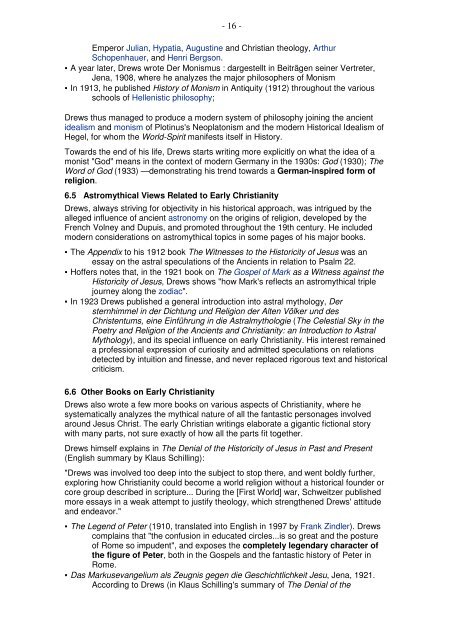
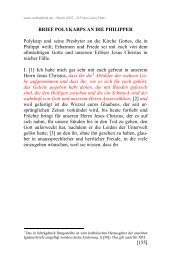
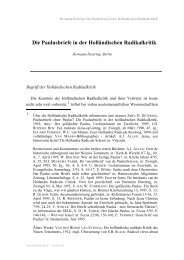
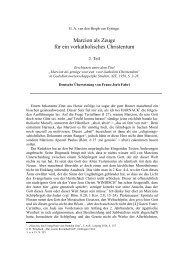
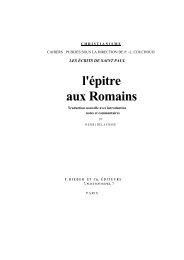
![[1] quibus tamen interfuit et ita posuit - Radikalkritik](https://img.yumpu.com/28285180/1/184x260/1-quibus-tamen-interfuit-et-ita-posuit-radikalkritik.jpg?quality=85)
